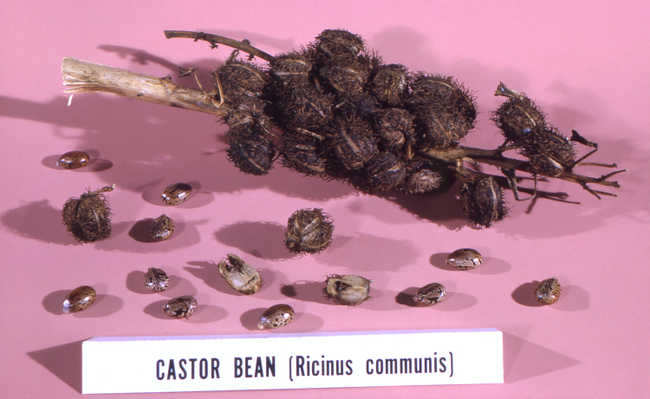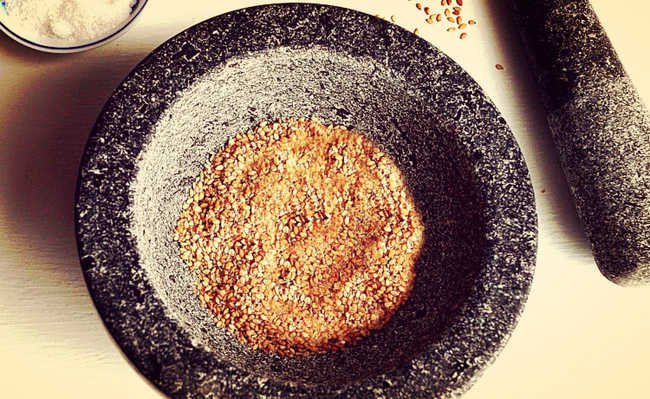Castor oil: how to use it and its benefits
Also known as castor oil, castor oil reduces pimples, fights thrush and more.

Castor oil or castor oil, the main product derived from the castor bean, is extracted from the castor seed, which corresponds to approximately 50% of the total seed. Castor oil is not toxic like castor bean seeds, because the toxic substance of castor bean, ricin, is not soluble in oil, being separated during the extraction process. For its fungal and bacterial fighting properties that prevent hair growth, castor oil is widely used to encourage hair growth.
- Learn about vegetable oil extraction techniques
The papaya tree (Ricinus communis L.) is a plant that grows in several regions of Brazil, mainly in Bahia and Ceará. The origin of this plant is not known for sure (certain sources say it is Asian, others claim it is African). Reports are cited that it has been used for thousands of years in Egypt and India. It is a shrub-shaped plant, which has a branched part in a reddish-green color, which may vary in color depending on the region. It can reach from one to six meters in height, depending on the size.
The fruit given by the papaya tree is called castor bean or castor. It is a capsule that can have different sizes, with thorns on the outside, and which has, inside, oval and smooth seeds.
The biggest risk of this fruit is in the ingestion of seeds. They are poisonous due to the presence of the toxic protein ricin, known to inactivate ribosomes - it penetrates the cell and paralyzes it. Even in small doses it can lead to death. Eating three seeds can kill a child and eight seeds an adult. Another active component in papaya is ricinin, different from ricin. It is present in every part of the plant, in flowers and leaves, and has effects on the nervous system when ingested.
Extraction can be done by cold or hot pressing, or by solvent. First, the seeds undergo cleaning and are cooked. In pressing, they are degummed to obtain oil. The cake left over from pressing goes to solvent extraction, where hexane or ethanol is used.
Castor oil for medicinal purposes is extracted by cold pressing, as it is clearer, colorless, free of ricin and free of acidity and impurities. Castor oil for industrial purposes, on the other hand, uses the hot pressing of the seeds, obtaining a clear, shiny oil, but with a maximum of 1% acidity and 0.5% impurities.
Castor oil is composed of 95% ricinoleic acid, which gives its applications and several benefits, the rest is given by linoleic, oleic and palmitic acids. Due to ricinoleic acid, castor oil is widely used in the chemical industry and is also responsible for its high viscosity and solubility in alcohol. It can be used as a raw material for biodiesel.
What is castor oil for

Edited and resized CDC image is available on Unsplash
Industrially, castor oil is used in the manufacture of paints, varnishes, plastics, glues, as a raw material for nylon and lubricants, as it is stable at both low and high temperatures, and can be used in compressors, transformers and also in formulation of biodegradable lubricants.
It also has cosmetic and medicinal use. In ancient Egypt, castor oil was burned as fuel in lamps, used as a natural remedy to treat illnesses such as eye irritation, and even given to pregnant women to stimulate labor (see study about it here: 1).
powerful laxative
One of the best-known medicinal uses of castor oil is as a natural laxative. It increases the movement of intestinal muscles, helping to expel stool and relieve constipation.
- What is constipation?
When ingested, castor oil is digested in the small intestine, releasing ricinoleic acid, the main fatty acid in castor oil. The ricinoleic acid is then absorbed by the intestine, stimulating a strong laxative effect (see study about it here: 2).
One study showed that older people who took castor oil had reduced symptoms of constipation, including the need for less effort during defecation and decreased feeling of incomplete evacuation.
The recommendation is to take a tablespoon, or 15 ml. Due to its fast laxative action, evacuation is expected to take place between one and three hours after ingesting castor oil.
Despite this, ingestion in high doses can cause side effects such as abdominal cramps, nausea, vomiting and diarrhea (see study about it here: 4).
- Diarrhea Remedy: Six Home-Style Tips
Although it can be used to relieve occasional constipation, castor oil is not recommended as a treatment for long-term problems.
Intake of castor oil for medicinal purposes is contraindicated for pregnant women, nursing mothers, children and people with bowel obstruction or perforation, irritable bowel, Crohn's disease, ulcerative colitis or any other bowel problem.
natural moisturizing cream
Castor oil is rich in ricinoleic acid, a monounsaturated fatty acid. These types of fats act as humectants and can be used to moisturize the skin.
Humectants retain moisture, preventing water loss through the outer layer of the skin (see study about it here: 3).
- How to make natural hair wetting?
Castor oil is widely used in cosmetics to promote hydration and is often added to products such as lotions, makeup, and cleansers. You can also use it on its own as a natural alternative to moisturizers and lotions that contain harmful substances. Learn more about this topic in the article: "Substances to avoid in cosmetics and hygiene products".
In addition, castor oil is affordable and can be used on both the face and body. As it is quite thick, it can be diluted with other oils such as almond oil, coconut oil and grape seed oil.- Sweet Almond Oil: Benefits for Beauty and Health
- Coconut oil: benefits, what is it for and how to use it
- Grape seed oil: benefits and how to use
Although the application of castor oil to the skin is considered safe for most people, it can cause an allergic reaction in some individuals (see study on this: 4).
Castor oil also helps soothe dry and irritated skin. It is quickly absorbed, stimulating collagen production, which reduces wrinkles and stretch marks. It has emollient and humectant properties that help in hydration, elasticity and smoothness of the skin. As a massage oil, it is great for relaxing the body and healing inflammation, such as arthritis, for a feeling of well-being. However, due to the high viscosity of castor oil, it should be mixed with other lighter vegetable oils, such as the aforementioned grape seed oil or sweet almond oil, to facilitate the smoothness of the massage.
It can also be applied to hair, skin, eyelashes and eyebrows - it is also widely used to make natural soap.
Accelerates wound healing
Applying castor oil to wounds brings moisture to the skin, improving the healing process. Castor oil stimulates tissue growth, and even protects the mucosa, as it creates a barrier between the wound and the environment, reducing the risk of infection.
It also reduces dryness and cornification, the accumulation of dead skin cells that can delay wound healing (see study about it here: 5).
Ointments containing castor oil help in the healing of bedsores, a type of wound that develops from prolonged pressure on the skin. A study that analyzed the healing of bedsores of 861 nursing home residents showed that wounds that were treated with the ointment containing castor oil had higher healing rates and shorter healing times than those treated with other methods.
- Rosehip Oil Has Proven Benefits
Powerful topical anti-inflammatory
Ricinoleic acid, the main fatty acid found in castor oil, has impressive anti-inflammatory properties. Studies have shown that when castor oil is applied topically, it reduces inflammation and relieves pain.
Castor oil's analgesic and anti-inflammatory properties can be particularly useful for those with inflammatory diseases such as rheumatoid arthritis or psoriasis.
- Psoriasis: what is it, treatment and symptoms
- Home Treatment Alleviates Psoriasis Symptoms
Animal and test tube studies have shown that ricinoleic acid reduces pain and swelling. In addition, another study showed that treatment with gel containing ricinoleic acid led to a significant reduction in pain and inflammation when applied to the skin, compared to other treatment methods.
Decreases the pimples
Acne is a skin condition that creates pus and painful lumps on the face and body. It is more common in teenagers and young adults and can negatively impact self-esteem.
Castor oil has several qualities that can help reduce acne symptoms. Inflammation is believed to be a factor in the development and severity of acne, so applying castor oil to the skin can help reduce symptoms related to inflammation (see study on this: 6).
Acne is also associated with an imbalance of certain types of bacteria normally found on the skin, including the Staphylococcus aureus (see study about it: 7).
Castor oil has antimicrobial properties that can help fight bacterial overgrowth when applied to the skin. A test tube study revealed that castor oil extract had considerable bactericidal power, inhibiting the growth of several bacteria, including Staphylococcus aureus.
Castor oil is also a natural moisturizer, so it can help soothe inflamed and irritated skin typical of acne.
Fights oral thrush
THE candida albicans is a type of fungus that commonly causes dental problems, such as plaque overgrowth, gum infections and root canal infections (see study about it here: 8).
Castor oil has antifungal properties and can help fight oral thrush.
- Candidiasis: know causes, symptoms, types and know how to treat
- Candidiasis in men: what it is and how to treat it
A test tube study revealed that castor oil fought the Candida albicans of human dental roots. It can also help treat denture-related stomatitis, a painful condition believed to be caused by overgrowth of the breast. Candida, a common problem in elderly people who wear dentures.
A study of 30 elderly people with denture-related stomatitis showed that treatment with castor oil led to improvements in the clinical signs of stomatitis, including inflammation.
Another study found that brushing and immersing the dentures in a solution containing castor oil led to significant reductions in Candida in elderly people who wore dentures.
Good for hair and scalp
Many people use castor oil as a natural hair conditioner.
- No Poo and Low Poo: what is it and how to do it
It is great to apply on dry hair, as it helps to lubricate the hair shaft, increasing flexibility and decreasing the chances of breakage (see study about it here: 8).
- Coconut oil on hair: benefits and how to use
Due to its anti-inflammatory and moisturizing properties, castor oil can also be an effective treatment for dandruff caused by seborrheic dermatitis and scaling.
It also helps in strengthening the scalp and hair growth. As it has antibacterial and antifungal properties, due to its high composition of ricinoleic acid, castor oil fights infections and the growth of bacteria and fungi that could impede hair growth.
- How to make hair grow fast and naturally
Therefore, if you are having problems with hair loss and flaws, castor oil is a great ally. It smoothes hair loss, accelerates growth and makes hair grow stronger and thicker. It is also possible to apply it in places where there are injuries, such as scars or burns on the scalp (places where the hair does not grow), castor oil can help with growth. If the case is genetic, like baldness, the oil will not cure the problem, it will only slow it down.
How to use castor oil on hair
Rub the castor oil into your hands, massage the scalp for five minutes and leave it on the hair for a few more minutes. Massaging the leather activates circulation and helps stimulate growth because of the presence of linoleic acid (omega 6), which strengthens and nourishes the strands. You can apply it two to three times a week, using it continuously for an extended period of time. Results appear after a few months of treatment. You should opt for 100% pure castor oil, free of any chemicals that could be harmful to your health, such as parabens. You can find pure castor oil at eCycle store.
Castor oil is also good for dry hair, split ends and itchiness. It provides hydration, leaving hair silky and shiny. The oil has a strong odor, which may bother some people, so avoid inhaling it and use it with a few drops (three drops of essential oil for every spoonful of castor oil) of your preferred essential oil.
- What are essential oils?
And it is not just in hair growth that castor oil can be used. It can also be applied to eyelashes, eyebrows and beards, helping their growth. There are no scientific studies that prove this fact, however, there are reports that the use of castor oil can be effective for these cases.
Precautions
Many people use castor oil to treat a variety of problems, either by ingesting it or applying it to the skin. Although it is generally considered safe, it can cause adverse reactions and unwanted side effects in some people.
- Can induce labor: It is used by medical professionals to induce labor. For this reason, women at all stages of pregnancy should avoid consuming castor oil (see study about it here: 9);
- May cause diarrhea: While it can be an effective way to relieve constipation, you can get diarrhea if you take too much. Diarrhea can cause dehydration and electrolyte imbalance;
- May cause allergic reactions: May cause an allergic reaction in some people when applied to the skin. First, try applying a small amount to a small patch of skin to see how your body reacts (see study on this: 10).










